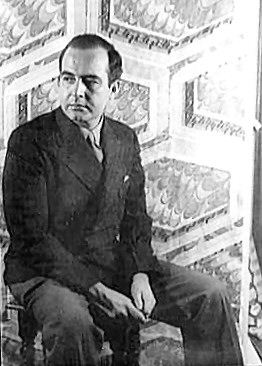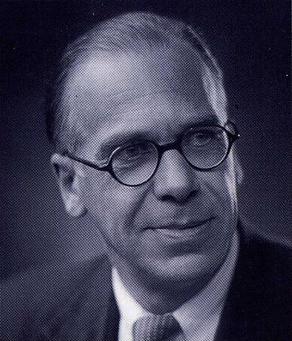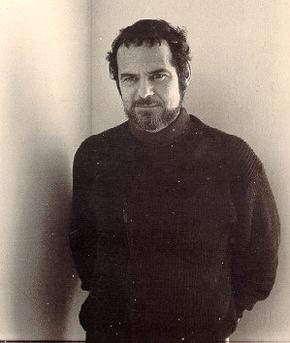Related Research Articles

An orchestra is a large instrumental ensemble typical of classical music, which combines instruments from different families. There are typically four main sections of instruments:
A concerto is, from the late Baroque era, mostly understood as an instrumental composition, written for one or more soloists accompanied by an orchestra or other ensemble. The typical three-movement structure, a slow movement preceded and followed by fast movements, became a standard from the early 18th century.

Samuel Osmond Barber II was an American composer, pianist, conductor, baritone, and music educator, and one of the most celebrated composers of the mid-20th century. Principally influenced by nine years' composition studies with Rosario Scalero at the Curtis Institute and more than 25 years' study with his uncle, the composer Sidney Homer, Barber's music usually eschewed the experimental trends of musical modernism in favor of traditional 19th-century harmonic language and formal structure embracing lyricism and emotional expression. However, he adopted elements of modernism after 1940 in some of his compositions, such as an increased use of dissonance and chromaticism in the Cello Concerto (1945) and Medea's Dance of Vengeance (1955); and the use of tonal ambiguity and a narrow use of serialism in his Piano Sonata (1949), Prayers of Kierkegaard (1954), and Nocturne (1959).

Erich Leinsdorf was an Austrian-born American conductor. He performed and recorded with leading orchestras and opera companies throughout the United States and Europe, earning a reputation for exacting standards as well as an acerbic personality. He also published books and essays on musical matters.

Walter Hamor Piston, Jr., was an American composer of classical music, music theorist, and professor of music at Harvard University.

Roger Huntington Sessions was an American composer, teacher, and writer on music. He had initially started his career writing in a neoclassical style, but gradually moved further towards more complex harmonies and postromanticism, and finally the twelve-tone serialism of the Second Viennese School. Sessions' friendship with Arnold Schoenberg influenced this, but he would modify the technique to develop a unique style involving rows to supply melodic thematic material, while composing the subsidiary parts in a free and dissonant manner.

Dimitri Mitropoulos was a Greek and American conductor, pianist, and composer.
Peter Mennin was a prominent American composer, teacher and administrator. In 1958, he was named Director of the Peabody Conservatory in Baltimore, and in 1962 became President of the Juilliard School, a position he held until his death in 1983. Under his leadership, Juilliard moved from Claremont Avenue to its present location at Lincoln Center. Mennin is responsible for the addition of drama and dance departments at Juilliard. He also started the Master Class Program, and brought many artists to teach including Maria Callas, Pierre Fournier and others.

William Alwyn, was an English composer, conductor, and music teacher.

"Asp" is the modern anglicisation of the word "aspis", which in antiquity referred to any one of several venomous snake species found in the Nile region. The specific epithet, aspis, is a Greek word that means "viper". It is believed that aspis referred to what is now known as the Egyptian cobra.
Samuel Hans Adler is an American composer, conductor, author, and professor. During the course of a professional career which ranges over six decades he has served as a faculty member at both the University of Rochester's Eastman School of Music and the Juilliard School. In addition, he is credited with founding and conducting the Seventh Army Symphony Orchestra which participated in the cultural diplomacy initiatives of the United States in Germany and throughout Europe in the aftermath of World War II. Adler's musical catalogue includes over 400 published compositions. He has been honored with several awards including Germany's Order of Merit – Officer's Cross.
Opposing Viewpoints is a series of books on current issues which seeks to explore the varying opinions in a balanced pros/cons debate. The series attempts to encourage critical thinking and issue awareness by providing opposing views on contentious issues. The online versions are managed by Cengage Gale and the print versions are available through Rosen publishing.

Stephen Joel Albert was an American composer. He is best known for his Pulitzer Prize winning Symphony No. 1 RiverRun (1983) and his Cello Concerto (1990), written for Yo-Yo Ma. He died suddenly in a 1992 automobile accident, having just sketched out his Second Symphony. The work was subsequently completed by Sebastian Currier, and his death sparked musical tributes from composer colleagues such as Aaron Jay Kernis and Christopher Rouse.
Does the World Hate the United States? is a 2005 book, edited by Andrea C. Nakaya. It is in the At Issue series of American textbooks, intended according to the publisher for grades 10 to 12+.

Andrei Yakovlevich Eshpai was a Soviet and Russian composer. He was awarded the title of People's Artist of the USSR in 1981.
Football is the most popular sport in Greece, followed by basketball.
Jung-Ho Pak is an American symphony conductor. He was Artistic Director of the San Diego Symphony and of the New Haven Symphony Orchestra, of which he is now Conductor Emeritus. He was Music Director of the Diablo Ballet and the NEXT Generation Chamber Orchestra. He was the artistic director of the now-defunct Orchestra Nova San Diego. Pak has guest conducted internationally. He was the Director of the Cape Symphony, and is a former musical director of the World Youth Symphony Orchestra and the director of orchestras at the Interlochen Center for the Arts. In May 2023, he announced that he was stepping down as the Artistic Director and Conductor of the Cape Symphony at the end of the summer.
Bradley Steffens is an American poet, playwright, novelist, and author of more than seventy nonfiction books for children and young adults.
Wolfgang Marschner was a German violinist, teacher of violin, composer and conductor. He was concertmaster of the WDR Sinfonieorchester Köln, and instrumental in world premieres of contemporary music. He was professor at the Folkwang-Hochschule Essen, the Musikhochschule Köln, the Tokyo University of Fine Arts and Music and, for more than three decades, at the Hochschule für Musik Freiburg. He also taught at the Darmstädter Ferienkurse.

The letter from Iddin-Sin to Zinu, also known by its technical designation TCL 18 111, is an Old Babylonian letter written by the student Iddin-Sin to his mother Zinu. It is thought to have been written in the city of Larsa in the 18th century BC, around the time of Hammurabi's reign. Disappointed with the quality of the clothes his mother had woven for him with regard to those of his peers, Iddin-Sin in the letter makes various attempts to manipulate his mother into feeling guilty and sending him new clothes. The letter is often cited as a document giving insight into daily life in ancient Mesopotamia and as an example of the unchanging essence of human nature through the ages.
References
- ↑ "Library of Congress Online Catalog: Don Nardo". United States Library of Congress.
- 1 2 Victor Davis Hanson's Private Papers, August 2004. Retrieved 2009-06-06
- ↑ Natick High School (June 1965). Sassamon. Natick, MA. p. 193.
{{cite book}}: CS1 maint: location missing publisher (link) - 1 2 3 4 "Don Nardo: Composer, Historian, Author, Screenwriter". November 25, 2008.
- 1 2 3 Miller, Barbara A. (February 24, 1988). "This Renaissance Man Turned Desire into Reality". Cape Cod News. p. 6.
- 1 2 Kinzl, Konrad (1999). Directory of Ancient Historians in the United States. Claremont, CA: Regina Books. p. 49.
- ↑ Crosby, Johanna (December 31, 1987). "Cape Duo's 'Spenser' Script to Air Sunday". Cape Cod Times. p. 15.
- ↑ "Obituary for Philip Meister". New York Times. April 5, 1982.
- 1 2 "The Barnstable High School Drama Club History".
- ↑ Grabarek, Daryl; Thornton-Verma, Henrietta (June 1, 2007). "Reference Review". School Library Journal.
- ↑ Texley, Julianna. "Outstanding Science Trade Books for Students K–12: 2008". National Science Teachers Association. Archived from the original on August 10, 2010. Retrieved June 7, 2009.
- ↑ White, John (March 17, 1981). "Nardo Composes 'Arthur', Oratorio". Insight. p. 7.
- 1 2 Ferreira, Pedro. "Pedro Ferreira: Bio".
- ↑ Harugari German Club "Cheshire Symphony Orchestra with Peter Ferreira Ensemble" Archived October 6, 2014, at the Wayback Machine , Newstimes.com , 14 June 2013.